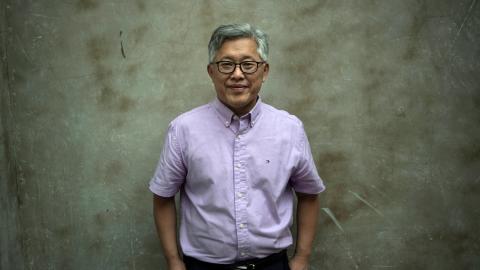Introduction
The Chinese Communist Party recently began its “largest coordinated, nationwide crackdown against an urban house church in over 40 years.” On October 10, CCP authorities detained Ezra Jin Mingri—the lead pastor of Zion Church—and approximately 30 other Zion pastors and associates. Party authorities handcuffed and detained Pastor Jin on allegations of “illegal dissemination of information online,” a crime under Chinese law. Zion Church is among the largest unregistered house churches in China, with congregations in over 40 cities. The church also hosts online prayer meetings and Bible studies that sometimes attract as many as 10,000 people.
This is not the first time the Chinese government has targeted Pastor Jin and Zion Church. In 2018, the CCP instituted new regulations on religious affairs and undertook a nationwide crackdown on unregistered house churches across China. Authorities forced Zion’s Beijing church building to close because it refused to comply with various CCP demands, including a request to install surveillance cameras inside the church. This forced Zion to transition to a principally online model.
That same year, the CCP cracked down on another prominent congregation, the Chengdu-based Early Rain Covenant Church. Authorities detained its lead pastor, Wang Yi, and later sentenced him to nine years in prison, fined him 50,000 yuan, and suspended his political rights for three years. He faced trumped-up charges for “illegal business activity” and “inciting subversion of state power.” He is still serving his sentence.
Though the CCP does not explicitly ban religious practice, it has a long history of persecuting Christians and other religious groups. Beijing seeks to regulate religion and religious practice through its Sinicization policies, which essentially secularize religion and make all faith subservient to the party. Since its 2018 crackdown, the CCP has barred anyone under the age of 18 from receiving any form of religious education, actively removed crosses from churches, and destroyed church buildings.
Pastor Jin, now a political prisoner, is of interest to the United States government because many of his family members are American citizens. His wife, daughter, and two sons are based in the US. His sons were born in the US, while his daughter became a citizen through marriage. Despite his persecution, Pastor Jin felt called to serve the people of China and returned to Zion Church after traveling to the US in 2018. He has since expressed an interest in being reunited with his family.
Now, the CCP appears to be undertaking another crackdown on Christianity across China. The US should strengthen its commitments to advancing religious freedom, press for the release of political prisoners (including Pastor Jin and Pastor Wang), and strengthen the tools at its disposal to hold the CCP accountable.
Why the Imprisonment of a Chinese Pastor Matters for US Policy
Pastor Jin’s detention coincides with a growing trade war between Beijing and Washington. Just two days before the CCP abducted him, the Chinese government announced broad new restrictions on the export of rare earth minerals and other important manufacturing and technological inputs. President Donald Trump responded by threatening to increase tariffs on China from approximately 55 percent to 100 percent if the CCP did not rescind these export restrictions by November 1.
President Trump and Chinese President Xi Jinping were slated to meet on the sidelines of the Asia-Pacific Economic Cooperation (APEC) summit in South Korea later this month. But President Trump has said there may be no reason for the two leaders to meet if the CCP continues to escalate the trade war. As of now, the meeting is still on.
In the midst of negotiations with Beijing, the White House has eased its criticism of the CCP’s human rights record in hopes of striking a deal. Pastor Jin’s detention demonstrates the human cost of this decision. The CCP is notorious for taking political prisoners to increase its diplomatic leverage while also demanding that negotiating partners withhold criticism of the regime’s serious and ongoing human rights violations.
Washington should not wait until relations between the two countries sour or negotiations fall apart to raise concerns over human rights. The CCP’s persecution of religious minorities like Christians, Tibetans, Uyghurs, Hong Kongers, and the Falun Gong is central to its efforts to maintain its grip on power. Ultimately, advancing the human rights of people across China would give Washington another counterweight to Beijing’s global ambitions.
Encouragingly, the US State Department issued a statement condemning Beijing’s detention of Zion Church members. Secretary of State Marco Rubio also condemned Beijing’s actions and echoed calls for his release on X.
Next Steps to Free Political Prisoners Across China
There are numerous practical measures Washington can take to free the church members, demonstrate that the US stands on the side of religious freedom and human rights, and advance American interests in the ongoing trade war with China.
The US should demand the immediate release of detained Zion Church members and offer them safe haven in the US. But Washington should also strengthen the tools at its disposal to secure the release of political prisoners worldwide and better integrate human rights and religious freedom concerns into its diplomatic mechanisms.
To do so, the administration, Congress, and federal agencies should take the following steps.
- Press for the unequivocal release of Pastor Jin. US diplomats should raise the cases of Pastor Jin and others imprisoned from Zion by name in every meeting with their Chinese counterparts. Officials should press for the unconditional release of Pastor Jin and all detained members of Zion Church and demand regular proof of life until they are free.
- Condition future diplomatic engagement with China on the release of political prisoners. President Trump has waffled over whether he will meet President Xi on the sidelines of APEC. He should demand Pastor Jin’s release before he or any other US official engages with their Chinese counterparts. The US should also raise the cases of other priority political prisoners. Given the administration’s recent success in securing hostages held by Hamas, this could be an additional win in the administration’s efforts to rescue those facing unjust detentions around the globe.
- Advocate for the release of all political prisoners across China, and in particular, focus on family members of US citizens and political prisoners of interest to US national security. The US should raise the cases of priority political prisoners like Uyghurs Gulshan Abbas, Ilham Tohti, Rahile Dawut, and Ekpar Asat; Tibetans like the eleventh Panchen Lama, Go Sherab Gyatso, and Konchok Nyima; Hong Kongers like Jimmy Lai, Gwyneth Ho, and Joshua Wong; persecuted Christians like Pastor Wang and Pastor Jin; and human rights defenders like Gao Zhisheng, Yu Wenshang, and Ding Jiaxiin. US diplomats should demand their immediate release in every meeting with Chinese officials.
- Adopt Pastor Jin’s cause in advocacy programs. The Tom Lantos Human Rights Commission enables members of Congress to adopt political prisoners around the world. By doing so, the member commits to advocating on their behalf by liaising with the executive branch, hosting hearings and events to raise awareness about the case, and negotiating directly with the offending nation’s government. Through this program, members of Congress have helped secure the release or conditional release of at least 14 political prisoners in China, according to the project’s own statistics. A member of Congress should adopt Pastor Jin and other Zion members to ensure their cause receives the attention it deserves.
- Hold a congressional hearing on the ongoing religious crackdown in China. In this hearing, members should call on executive branch officials to testify about the measures they are taking to secure the release of political prisoners. One of the most effective actions members of Congress can take to secure a political prisoner’s release is to hold hearings with high-ranking members of the administration to ask about the specific steps they have taken to advance the political prisoner’s cause. Congress should consider holding a hearing on the persecution that Christians now face in China to highlight Pastor Jin’s case.
- Designate Pastor Jin as a religious prisoner of conscience (RPOC). The US Commission on International Religious Freedom (USCIRF) should officially designate Pastor Jin an RPOC, and a commissioner should adopt his cause. The USCIRF is a quasi-nongovernmental organization that complements US government efforts to safeguard freedom of religious belief around the globe. The commission can designate individuals in nations on its roster of countries of particular concern or its Special Watch List. The purpose of these programs, according to USCIRF, is to “raise public awareness of these prisoners, reduce the overall number of prisoners in captivity, and highlight religious freedom conditions in their country of imprisonment.” Additionally, USCIRF commissioners can adopt the causes of specific RPOCs. This advocacy has helped free many political prisoners, including some in China.
- Sanction individuals and entities involved in violating religious freedom and taking political prisoners. The Treasury Department should issue specific tranches of sanctions at key diplomatic moments to promote the release of these and other political prisoners. It should make full use of Global Magnitsky authorities and other mechanisms, on both human rights and national security grounds. The State Department should also make full use of its new authorities under Section 212(a)(3)(C) to restrict the visas of individuals responsible for wrongful and abusive or unjust detentions of both American citizens and foreign nationals.
- Establish an Office of Political Prisoner Advocacy (OPPA) and appoint a special envoy for political prisoner advocacy. The OPPA should be tasked with coordinating and managing US efforts to secure political prisoner release globally. Its priority would be to advocate for the release of political prisoners relevant to US national security. Congress should require the office to release an annual report identifying key political prisoners and what the office, civil society, and Congress have done or can do to secure their release. The special envoy would lead the OPPA. The envoy should be Senate-confirmed and of ambassador rank, and he or she could serve as a liaison between the executive branch, Congress, and civil society. This would centralize the processes for securing political prisoner release, updating families on the status of political prisoners, and coordinating government and civil society responses to extrajudicial imprisonment. To streamline the process, the envoy could coordinate with other key nodes tasked with political prisoner advocacy in the State Department. Additionally, the special envoy could work with the Department of the Treasury and other relevant agencies like the National Security Council to identify individuals who could be sanctioned for facilitating arbitrary detentions.
- Create a designation of arbitrarily detained for political prisoners. The US has a robust apparatus for securing hostage release for individuals the State Department labels wrongfully detained. While the definition of wrongfully detained can apply to political prisoners, it usually denotes that someone is a hostage. The department generally uses the informal term arbitrarily detained to refer to political prisoners. The special envoy and the OPPA should have the power to officially label political prisoners as arbitrarily detained, publish a list of these individuals in its annual report, and exercise authorities similar to those of the hostage release apparatus to obtain the freedom of these individuals.

















